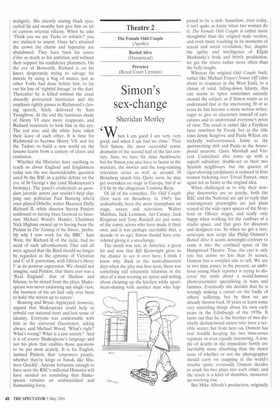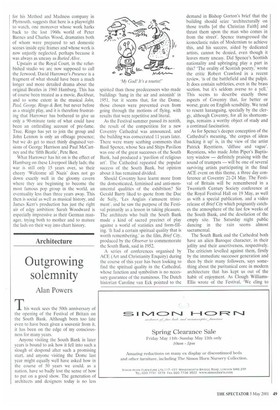Theatre 2
The Female Odd Couple (Apollo) Buried Alive (Hampstead) Presence (Royal Court Upstairs)
Simon's sex-change
Sheridan Morley
When I am good I am very, very good; and when I am bad we close.' Thus Neil Simon, the most successful comic dramatist of the second half of the last century. Sure, we have Sir Alan Ayckbourn; but for Simon you also have to factor in the musicals, the movies and the long-running television series as well as around 30 Broadway smash hits. Quite soon, he may get overtaken on stage in Europe, but if so it'll be by the ubiquitous Yasmina Reza.
Of all of his comedies, The Odd Couple (first seen on Broadway in 1965) has undoubtedly been the most triumphant on stage, screen and television; Walter Matthau, Jack Lemmon. Art Carney, Jack Klugman and Tony Randall are just some of the comic actors who have made it their own, and it was perhaps inevitable that, a decade or so ago, Simon should have considered giving it a sex-change.
The result was not, in America, a great hit and now that Bill Kenwright gives us the chance to see it over here, I think I know why. Back in the male-chauvinist days when the play was first seen, there was something still inherently hilarious in the idea of a man wearing an apron and setting about cleaning up the kitchen while apartment-sharing with another man who hap
pened to be a slob. Somehow, even today, it isn't quite as funny when two women do it: The Female Odd Couple is rather more thoughtful than the original male version, and even more touching in its moments of sexual and social revelation, but, despite the agility and intelligence of Elijah Moshinsky's brisk and brittle production, we get the titters rather more often than the belly-laughs.
Whereas the original Odd Couple built, rather like Michael Frayn's Noises Off (also about to reappear in the West End), to a climax of total, falling-down hilarity, this one seems to tiptoe sometimes uneasily around the subject, as if Simon wants us to understand that in the intervening 30 or so years he has become a more serious writer, eager to give us characters instead of caricatures and to understand everyone's point of view. The result is rather like a Feydeau farce rewritten by Freud, but in the title roles Jenny Seagrove and Paula Wilcox are wickedly well-contrasted, Jenny as the sportswriting slob and Paula as the houseproud neurotic. Qarie Marshall and Vincent Carmichael also come up with a superb subsidiary double-act as their two Spanish neighbours, but the quartet of cigar-chewing cardplayers is reduced to four women bickering over Trivial Pursuit, once again not as funny as the original idea.
When challenged as to why their newplay discoveries are so patchy, both the RSC and the National are apt to reply that contemporary playwrights are just plain scared of the wide open spaces of the Stratford or Olivier stages, and really only happy when working for the confines of a studio space, and that goes for directors and designers too. So when we get a rare, semi-epic new script like Philip Osment's Buried Alive it seems downright contrary to cram it into the confined space of the Hampstead Theatre. True, the cast is only ten; but across no less than 34 scenes, Osment has a complex tale to tell. We are in two time zones: in the present, an ambitious young black reporter is trying to discover the truth about a world-famous photo-journalist specialising in wars and famines. Eventually she decides that he is wrongly making a career on the backs of others' suffering, but by then we are already thrown back 30 years to learn some very unsettling things about his own early years in the Edinburgh of the 1970s. It turns out that he is the brother of two distinctly dysfunctional sisters who have a terrible secret; but from here on, Osment has real trouble keeping his two time-zones separate or even equally interesting. A couple of deaths in the immediate family are inevitably more absorbing than the moral issue of whether or not the photographer should carry on snapping in the world's trouble spots; eventually Osment decides to crash his two plays into each other, and the result is a kind of shambles, moreover an overlong one.
But Mike Alfrecls's production, originally for his Method and Madness company in Plymouth, suggests that here is a playwright to watch, one moreover whose work harks back to the lost 1960s world of Peter Barnes and Charles Wood, dramatists both of whom were prepared to set domestic scenes inside epic frames and whose work is now unjustly neglected, perhaps because it was always as uneasy as Buried Alive.
Upstairs at the Royal Court, in the refurbished studio we are now supposed to call the Jerwood, David Harrower's Presence is a fragment of what should have been a much longer and more detailed drama about the original Beatles in 1960 Hamburg. This has of course been treated as a movie, Backbeat, and to some extent in the musical John, Paul, George, Ringo & Bert, but never before as a straight play, and it is therefore frustrating that Harrower has bothered to give us only a 90-minute taste of what could have been an enthralling account of pre-fame. True. Ringo has yet to join the group and John Lennon is only an offstage presence; but we do get to meet thinly disguised versions of George Harrison and Paul McCartney and the 'fifth Beatles, Pete Best.
What Harrower has hit on is the effect of Hamburg on these Liverpool likely lads; the war is still only 15 years over, so their cheery 'Welcome all Nazis' does not go down exactly well in the gloomy cavern where they are beginning to become the most famous pop group in the world, an eventuality less than three years away. This then is social as well as musical history, and James Kerr's production has just the right air of edgy ambition: Sarah Woodward is especially impressive as their German manager, tying both to mother and to mature the lads on their way into chart history.











































































 Previous page
Previous page